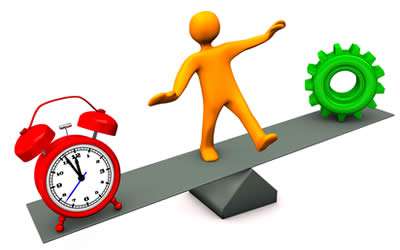Time Management is the coordination of tasks and activities so that we can maximize the efficiency of efforts done by an individual. The primary objective of time management is to enable people to get more work done in less time. Elements of effective time management include organization, planning, and scheduling to take advantage of the time available.
You must take into account an individual’s particular situation and their relevant skills and expertise to understand time management techniques.

Time Management
Time Management refers to the process of prioritizing tasks based on how important or urgent they are. It means you first need to identify the most important tasks and then systematically organize them. The next step is to allocate time to effectively accomplish them. This approach plays an important role in assisting managers and team heads in high-impact activities, managing time effectively, and then achieving their goals more effectively.
Importance of time management:
Time management plays an important role in an organization because of many reasons:
- The importance of time management lies in its ability to assign meaning to time, allowing people to make the most out of their time.
- Good time management skills permit employees to deliver quality work and meet their goals more effectively.
- Time management assists managers in understanding what employees can do in their capacity.
- Time management helps employees to set realistic goals.
- It demands active decisions about what a person wants to do.
- Without active time management, employees lose control over their work and lives and rely heavily on external stimuli.
- Good time management creates a healthier workplace overall.
Advantages of time management
The advantages of time management apply equally to all businesses and their employees. Some of the advantages are as follows:
- Happy employees
- Enhanced creativity
- Better work experience
- Improved reputation
- Doubled productivity
Let’s have a look at these advantages one by one.
Happier employees
When employees get plenty of time to perform their tasks daily, they are happier and less prone to work burnout.
Enhanced creativity
When employees are not distracted by time issues, they have more space and energy to be more creative in their work. They can engage in their work more actively instead of just blindly giving it a reaction and it in turn brings innovation.
Better work experience
If employees have better work experience in one place, they stick to one job for a long time and are less likely to focus on other jobs elsewhere.
Improved reputation
Businesses that focus on effective time management are considered the best places to work and improve the recruitment process of employees.
Techniques and tips for time management
Listed below are the tips to achieve better first-line time management.
- Keep a journal on your desk to keep track of your daily activities. It helps you to stay focused and productive. You can use that information to manage the schedule of tasks.
- Take time out at the start of each day to focus on a list of measurable goals and methods of how to approach them.
- Schedule your daily tasks based on your priorities.
- Manage time of communication when available. Open email and other scheduling apps at scheduled times rather than engaging with them all day.
Don’t agree to work more than you can manage
Conclusion:
Time management is an important aspect of any organization’s success and helps individuals prioritize their tasks effectively. Employees can optimize their productivity and contribute towards the prosperity of any organization by focusing on high-priority activities.
Benefits of time management include happier employees, enhanced creativity, better work experience, improved reputation, and doubled productivity. Adopting activities such as journaling, prioritizing tasks, and managing communication can further enhance the time management process.


